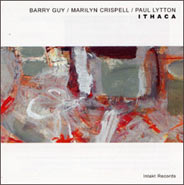
Barry Guy/Marilyn Crispell/Paul Lytton
Ithaca
(Intakt)
For
a long time now, the pronouncements by the press about the bad health
of the avant-garde – sometimes translating into a death certificate
– didn’t appear to coincide with the music playing in my CD player.
A circumstance which seems particularly painful today, when more than
a few avant-garde musicians appear to have attained a condition of "classicity",
with maturity and a certain (relatively speaking!) accessibility being
the outcome of long experimentation and distillation of language, not
the fruits of narrower horizons and "clever" moves. The sad
news being that the same trendiness that used to characterize the mainstream
press – and the most commercial trends such as jazz-rock and those voluptuous
female vocalists – appears to have spread into those magazines which
(for love or money) dedicate more than a few pages to less commercial
realities; so we have to read only about that particular saxophone player
– and piano player, and drummer, and bass player and record company.
The same happens when it comes to national tours, with the very same
musicians representing our "new horizons" (and what about
all the other musicians – will they have to wait to be all rediscovered
post-mortem?).
It’s
at least starting from 1970 – i.e., the founding of the London Jazz
Composers Orchestra – that bass player and composer Barry Guy is a worthy
presence in the European (post-jazz? improvised? extra-classical?) panorama.
The same can be said of Paul Lytton, one of the few drummers/percussionist
that have worked hard to make the space covered by the concept we call
"percussion" quite a bit wider. The two musicians have worked
together in a variety of situations, for instance in the famous (well…
relatively speaking) Evan Parker Trio (and here I have to mention at
least his Electro-Acoustic Ensemble). Once a decisive part of the Anthony
Braxton quartet, with an excellent solo career in full bloom – check
her recent CD Storyteller – Marilyn Crispell has played with Guy and
Lytton on works by the aforementioned London Jazz Composers Orchestra
and by the Evan Parker Trio – I have a weakness for the excellent After
Appleby (2000).
Odyssey
(2002) had been a wonderful release: a CD where brief (and quite controlled-sounding)
improvisations alternate with long compositions penned by Guy. Compositions
where the bass player made the trio sound as a "pocket orchestra"
– hence, a certain division of labour. This was true of the compositions
that had already been played by a large line-up (for instance, Double
Trouble Too and Harmos) and of those that had been especially composed
for the record (such as Rags).
Ithaca
appears to have the "improvising trio" at its center – let’s
not confuse it with the usual "piano trio" playing music "by
the numbers" – just check the original part played by Lytton’s
cymbals. Well-served by a clear recorded sound that invites the listener
to turn up the volume, Lytton is excellent in his speeding up on cymbals
(Fire And Ice), in his colorful introduction to an improvisation (Broken
Silence), in his dialogue with the double bass (Zinc). More than on
the previous album, Guy appears to lead from the instrument, not from
the written page; and he has also some very good solos (check the three
Shard tracks). Crispell’s piano is as mature as we’d expect, just as
good in the agitated climates of Fire And Ice and Zig Zag, with their
traces of Cecil Taylor, and in those more tranquil moments such as Ithaca
and Void (For Doris), the latter – for this writer, at least – reminiscent
of Lady Of The Mirrors-era Anthony Davis. Ithaca’s final track is the
meditative and concentrated Klaglied. Five stars, etcetera.
Beppe
Colli
©
Beppe Colli 2005
CloudsandClocks.net
| Jan. 16, 2005


